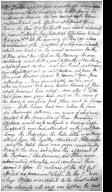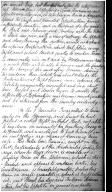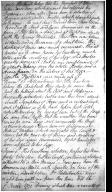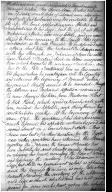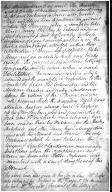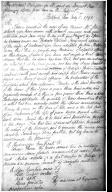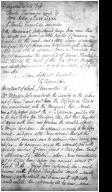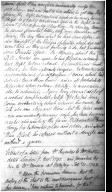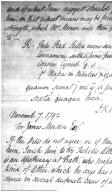[ Mr. Morden Case with Medicines ] Dr. William James Almon
Date: The case began sometime in 1789, and includes correspondence up to November 1792. | 1790/01/01 to 1800/01/01
Source:
Manuscript Notebook of Dr. William James Almon
Institution: Nova Scotia Archives
| Source Origin: Almon Family Fonds
| Reference: MG 1 / Microfilm Reel 10,045
In nine manuscript pages, Dr. Almon presents a detailed case study, with descriptions of symptoms and medicines used, of the illness and demise of one Mr. Morden of Halifax and Aylesford, Nova Scotia, pp. 223-31. The case study also includes transcriptions of correspondence from Dr. Reynolds of London, England, with whom Almon consulted about the case. The transcribed letters to Dr. Almon and to Mrs. Morden (via Mrs. Butler), include Latin prescriptions recommended by Dr. Reynolds.
Mr. Morden aged 53 Years originally of a sanguineous
temperament but at present of a lax habit - during his
residence in America, has been troubled bilious
complaints and gouty Affections at different times.
During the Year 1789 his Health was much impaired
by frequent attacks, Erysipelatous Affections, Violent
Strangury &cc till the beginning of May 1790 - when
he complained of the Symptoms of a common Catarrh,
which was treated in the usual manner. On the
16 May about two oClock in the Morning he was
suddenly seized with a great difficulty of breathing,
a tightness and stricture across his Breast, great Anxiety
was obliged to get into an erect posture, and have the
Door and Windows opened to prevent him, from
suffocating. I was immediately sent for; and
upon my arrival took away twelve Ounces of Blood
which procured him relief - soon after 5 [qrs] of the
Fotid Gum were given him, and in the course of
two hours, a remission took place and he became
Calm -. As the Disease had now taken the form
of a Spasmodic Asthma, our views of relief were
directed to the prevention of these Spasmodic
Affections, as well as to mitigate a teazing Cough.
His appetite was bad, attended with great flatu-
-lency, the Body open, the Pulse little or nothing
altered from the healthy standard. Pills compo-
-sed of the Fotid Gum were given occasionally
through the day, and upon the approach of
the Dyspniea, Laudanum, and Ether were
administered seperately, and combined, these
seemed to lessen the violence of the Fit, but
afforded no permanent relief - On the 7.th June
a large Blister was applied to the breast which
drew extremely well and was kept on the part
for several Days, but this did not afford the relief expect
-ed. Pills composed to Assafotida, Gum Ammoniac and
Squills were also given, in doses twice or thrice a day, which
lessened the Cough, and promoted Expectoration, proved
sufficiently laxative, and in the course of a few weeks,
the Bark and Infusion, and Tincture with the Vitriol-
ic Acid was given, with a view of restoring the Appetite
and strengthening the system, as well as to check
the copious Perspirations, which took place every
Night, and which tended greatly to weaken him.
He occasionally rode out, and by Midsummer was
so much better, as to be able to remove into the Country
for the change of Air and using Exercise _ during
his resident there (which was about 10 Weeks) the
Perspirations at Night became more copious, the
Debility consequently increased and in a short
time his feet and Ancles began to swell; the
difficulty of Respiration was become much greater,
and he returned from the Country evidently
worse.
On the 1.st November I was called to him
early in the Morning, and found he had
passed a restless Night, without Sleep, not able
to lay down on account of his breathing being so
difficult, and was obliged to keep himself in
an erect posture as a means of procuring him
ease _ His Pulse low, Nausea, weight in the
Chest, particularly at the Scrobiculis Cordis, &
says, when he lays down, is sensible of a
gurgling noise in the Abdomen, which is dis-
-tended and appears to contain water; his
Countenance is leucophlegmatic, passes his
Urine in small quantities, which is high colour-
-ed; great Thirst, his Legs and Feet are Odema-
-tous; but his Appetite in general was pretty
good
good. He had taken two tea Spoonfuls of Ether
before I saw him, which as usual had relieved the
Dyspnoea _ Soon after I gave him a solution of
Manna and Tartar Emetic, which operated gently
both ways. The next day I ordered him Squills com-
-bined with Soap and Gum Ammoniac in the
form of Pills twice a day; and at Night an opiate
with the Kermes Mineralis. This Plan was follow-
-ed daily and in the course of a short time, the
discharge of Urine was much encreased, tho’ at-
-tended with some pain, his breathing much
better and the swelling of his Leggs and Ancles
greatly decreased, but he now complained of
a great Itching over his whole Body, and a
severe pain in the Calves of his Leggs __.
Gentle Frictions were made use of.
Novembr. 21st Still continues his Pills, has been
taking the Chalybeate Wine daily for some time
past, the fullness about the Chest and Abdomen
has greatly subsided; but he was this Eveng: attack-
ed with Symptoms of Fever and a violent Cough,
and it appears as if he had taken fresh Cold,
notwithstanding he has not been out of the House
for some time past. But the weather has been
rainy for some Days - and consequently the House
extreemly damp. I gave him an Antimonial
Pectoral Mixture which mitigated the Cough &
Fever; but the paucity of Urine and swelling
of his Legs again commenced, tight bandages
were applied to his Leggs.
Decem.~ 6.th His breathing is better, passes his Urine
Freely, body open _ but his Cough continues violent,
expectorates a thin Mucus _ I now gave him the
Ammoniac Milk with Squills, in lieu of the
mixture ordered before. Dr. Halliburton now
Visited him with me from this time ‘till the
1.st June 1791. During which time a variety of
Medicines were given, as Diuretics, [Corroborants],
Mineral Waters, Fox Glove, Lime Water, & Decocti
-on of Leeks; small doses of Calomel were also admi -
-nistered, but his bowels were too irritable to bear
its use, the local applications, were Blisters and
Scarifications to his Leggs - but the relief all these
Medicines afforded, was very little, and we were
obliged to have recourse to the Squill Pills before
mentioned, as the only Diuretic to be depended upon
-- after a short time this preparation disagreeing
with his Stomach, an Infusion of Squills with
Horse Radish & Mustard Seed in Wine was given
him which promoted the urinary Secretion, simi
-lar to the Pills. I continued him in this course
‘till August when he went again into the Country
and returned the beginning of Novemb.~ when
his general Health seemed to be mended _ though
the Asthma and Dropsical Affection remained -
He now changed his Wine from Madeira & Port
to Old Flock, which agreed extreemly well with
him, mended his appetite, and strengthened his
constitution greatly _ At the beginning of the
year 1792 _ the symptoms of his disorders were
much lessened, his appetite extreemly good, and
seemed almost in a Convalescent state. This
Truce was but of a short duration, for the Dysp-
-noa & other symptoms have returned, the Stomach
rejecting the Infusion, the Vinegar of Squills has
been substituted, and operates equally favourably
in relieving his breast, increasing the flow of Wine,
and lessening the swelling of his Abdomen &
Leggs, but still no permanent relief is obtained,
and the progress to a Cure is only Palliative.
Notwithstanding the swelling of the abdomen
and Leggs is much abated and has not gained
ground for some weeks past, yet on the whole
his
his other complaints are worse. The Anxiety
and difficulty of breathing comes on almost every
Night, and continues so severe as to prevent
Sleep, and obliges him to continue in an erect
Posture ‘till Morning, when a remission takes
place. During the Day he labours under a
great drowsiness and propensity to Sleep,
complains of a great soreness and pain in the
Chest, a violent Cough, attended with a think
expectoration of Mucus, Loss of Appetite, flatu-
-lency, and an inability to use any bodily
exercise. The going up or down stairs fatigues
him greatly, and the whole system is much
Debilitated. The urinary secretion is high
coloured, and the quantity, in proportion to the
Squills he takes. His body is open and the
stools are laxative and watry. Laudanum
lessens the violence of the Spasms, and gene-
-rally procures sleep, the succeeding Night. Great
attention has been always paid to keeping
up his strength, by a good and generous diet,
/Hock Wine &.cc/ on which more reliance has
been made than by Medicine, for the Bark,
Chalybeate, and other Tonics, have always disa-
-greed with his Stomach and Bowels. The only
Medicines which he now takes are the
Vinegar of Squills, & Laudanum, occasionally.
And at times when the symptoms are not
severe an Aromatic Bitter Infusion is ad-
-ministered with a view of strengthening his
Stomach.
The above Case was given to his Son in Law Mr. Dight
who embarked for England in the ^MayPaquet. On his arrival
he took Dr. Reynolds / President of the College of
(Physicians) Opinion on it, and in August I recd the
following Letter from him on the Subject -
Bedford Row July 1st - 1792
Sir,
I have considered the case of my Friend Mr. Morden
which you have drawn with so much accuracy, with great
attention, and I am sorry to say with great regret, as I fear
he labours under an Hydrops Pectoris. I very much approve
of the mode of treatment you have adopted for him. It appears
to me, that there is scarcely any Medicine of reputed efficacy
in this disease, of which you have not made a trial. You
observe that the Fox-Glove has been tried, but you do not say
in what dose it has been given, nor how long it was persist
-ed in. I have in several instances of Hydrops Pectoris admi
-nistered it, with great success, and confess that I have never
found any thing of equal efficacy. The preparation of the
Digitalis which from experience I prefer, is the dried powder
of the leaves. Of this I gave a grain three times a day, and
gradually increase it to three or four grains three times a day
I always add double the quantity of Pulvis Aromaticus to it
or what has been usually called the species aromaticus-
It may be given in the form of Pills, and a tea Cup-full
of an Infusion of the tops of green broom, drank after
each dose. I wish this to be tried and persisted in for eight
or ten days. If in that time it does not appear, to excite
the action of the Kidneys, and to increase the urine consi
-derably, I would urge it no further, but beg leave to
recommend the following
R. Hydrargyr purificati ℈i.
Conser: Rosæ [?] ij probe simul tere in
mortario marmoreo, donec globuli evanuerint,
et adde pulv. rad. scillæ siccatæ gr. X fiat
massa in pilulas XV dividenda quarum sumat
iij singulis noctibus.
R. Ligni. Quassiæ incis ʒij
Rad: Zingib: contus. ʒj
Kali ppth [??] ʒss
Aquæ ferventis Mi[sce] macera
et liquorem frigefactum cola.
R. Liquoris colati ℥iss
Tinctur: Cinnamom. comp. ʒj
F. Haustus bis quotidie sumendus.
If the Mercurial pills should purge him more than
his strength will permit, a little power of Cinnamon may
be added to the mass - and a little opium if absolutely
necessary - but if opium can be dispensed with, I would
rather with it to be abstained from, as I generally find
that it diminishes the quantity of Urine. I particularly
wish, that in the trial of the Fox Glove, opium
and all its preparations may be avoided, if possible
I am sir
Your obedient Servant -
J R Reynolds.
An extract of which I transmitted to
Mr. Morden / who went into the Country in the latter
end of June / and sent him the Digitalis in Pills as
above recommended, with the Mercurial Pills - I visited
him at Aylesford about the 15.th September, and he told
me he had taken ten Fox Glove Pills, but that they did
not agree with him nor produce the sensible effects
the Vinegar had done _ he appeared evidently to be losing
[g]round - and soon after I was informed that all his
[co]mplaints increased, and he despaired of ever seeing again
Halifax _ he however made the attempt, and with
difficulty reached Dobson’s / about 15 Miles from Town /
[o]n Saturday 26.th October _ when I was immediately
[s]ent for to see him; upon my arrival about 5
O’Clock P.M. I found him extremely low _ much
[o]vercome with fatigue _ his pulse small _ counte
nance greatly altered, and it was with difficulty
[he] could relate, how extremely ill he was _ some
warm spiced Wine was given occasionally as also Wine
and Sago _ and was put to bed where he got some Sleep
during the Night, but wandered much in his mind, he was
obliged to get out of bed several times in the Night, on ac
-count of his difficulty of breathing - On Sunday Morning
he seemed somewhat better, took more Nourishment
during the day than what he had done before, as
also two doses of the Vinegar of Squills, which did not
vomit him as they used formerly to do, but produced
some Diuretic effects _ On Monday about One oClock
PM. I visited him again _ he had passed an extremely
bad night, but was rational _ his countenance much
altered, his Pulse extremely irregular. Extremities cold
and complained of a suppression of Urine, which had
subsided two or three hours _ and in all probability
depended upon extreme debility _ he was scarce
able to articulate _ I gave him several doses of
a cordial camphorated Julep & he passed some
Urine involuntarily which relieved his mind, he
took also some Sago and Wine - but the fatal conclu
-sion was evidently drawing night, his Pulse became
weaker and weaker, the facies Hippocratica more
strong, his Extremities colder and colder, and about
three OClock he expired without a struggle and
without a groan.
__________________________________________
Extract of a Letter from Dr. Reynolds to Mrs Butler
dated London 7- Nov. 1792 - and forwarded by
her to Mrs Morden at Halifax - Feb.y 10 - 1793
“Upon the persuasion however that the
dropsy of the chest is the most dangerous part of
his disease, I have ventured to prescribe for that
and if what I now suggest should fortunately relieve
him, in that respect means may be found of giving him
strength, which Mr. Almon will then particularly attend
to -
Rx Pulv. Rad. Scillæ recens siccatæ gr. xij
Cinnamom. subtilissime pulverat. gr. xxxvj
Conserv. Cynosb. q[uantum] s[ufficit]
F[ia]t Massa in pilulas xij dividenda
quarum sumat i vel ii (si ferat ventriculus)
sexta quaque horâ.
JRR
Novemb. 7. 1792
For James Morden Esq.
If the pills do not agree, or if they do not relieve
him, I wish him to try Tickells Other. Mr. Tickell
is an Apothecary at Bath, who prepares a particular
kind of [E]ther, which he says has been of remarkable
service in several desperate cases of water in the chest.
Translation
[Latin recipe on bottom of sixth image and top of seventh]
Recipe: 1 scruple of purified quicksilver,
2 [?] of rose conserves, mix together and grind in a marble mortar until the lumps disappear, and add 10 grains of dry powder of squill root. Make a mass to be divided into 15 pills. Take three of these every night.
Recipe: 2 drams of cut bitter-wood,
1 dram of bruised ginger root,
½ dram of [??] kali, 1The “kalis” include a wide range of potassium compounds (potash) used in medicine. The term comes from the German Kahle, for potash. boiling water.
Mix, macerate, and
keep the liquid chilled.
Recipe: ½ ounce of the prepared liquid,
1 dram of prepared cinnamon tincture,
make a drink to be taken twice daily.
[Latin recipe on ninth image, lines 5-10]
Recipe: 12 grains of fresh, dried, powdered root of squill; 36 grains of very finely powdered cinnamon; as much rose hip preserves as needed.
Make a mass to be divided into 12 pills. Take one or two (if the stomach can handle it) every six hours. JRR
Latin translation and transcription by Winston Black
Download: Transcription | Images
